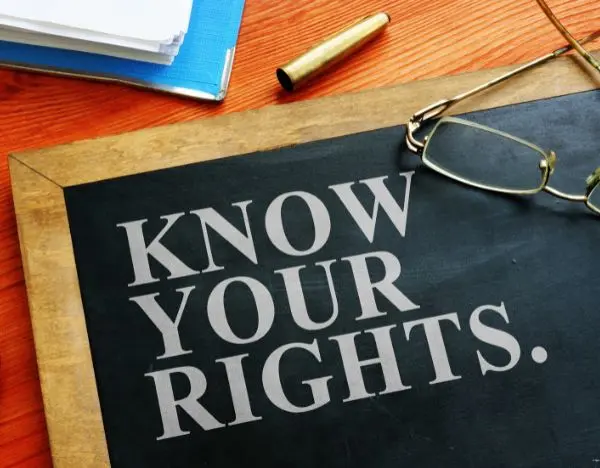New York Civil Rights & Criminal Defense Lawyers
Prisoner Abuse Lawyer
At Sivin, Miller & Roche LLP, we believe that every individual deserves to be treated with dignity and respect regardless of their circumstances. Unfortunately, prisoners often face abuse and mistreatment that violate their fundamental rights. Our experienced prisoner abuse lawyers in NYC are dedicated to defending the rights of incarcerated individuals and holding responsible parties accountable for their actions. Contact us today for immediate assistance.
What Constitutes Prisoner Abuse?
Prisoner abuse encompasses a wide range of wrongful actions and inhumane conditions that inmates may endure while in custody. This can include physical violence, sexual assault, denial of medical care, and exposure to unsanitary or unsafe living conditions. Such abuses not only violate the rights of prisoners but also undermine the principles of justice and humanity.
Constitutional Rights of Prisoners

Prisoners retain certain constitutional rights to protect their dignity, health, and well-being. At Sivin, Miller & Roche LLP, we defend these rights and ensure they are upheld within correctional facilities.
Protection from Cruel and Unusual Punishment
Under the Eighth Amendment, prisoners are protected from:
- Physical Abuse: No beatings, excessive force, or other physical abuse.
- Inadequate Medical Care: Prisons must provide necessary medical treatment.
- Inhumane Conditions: Basic necessities like food, clothing, shelter, and sanitation must be adequate.
Right to Due Process
The Fourteenth Amendment ensures:
- Fair Disciplinary Hearings: Procedural protections during disciplinary actions.
- Access to Courts: Inmates can challenge convictions and confinement conditions.
Right to Free Speech and Expression
The First Amendment allows:
- Communication: Inmates can communicate with family, friends, and legal representatives.
- Religious Practices: Prisoners can practice their religion and attend services.
Right to Equal Protection
The Fourteenth Amendment provides:
- Non-Discrimination: Equal treatment regardless of race, gender, religion, or other characteristics.
Right to Privacy
Prisoners have limited but important privacy protections:
- Respectful Searches: Searches must be conducted with respect for dignity.
- Confidential Legal Communications: Legal correspondence and attorney conversations are protected.
Right to Safety
Prisoners are entitled to protection from violence and threats:
- Protection from Inmate Violence: Prisons must take measures to protect inmates.
- Safe Environment: Adequate staffing and security measures must be maintained.
How a Prisoner Abuse Lawyer Can Help
At Sivin, Miller & Roche LLP, we understand that prisoner abuse is a severe civil rights violation. Our experienced prisoner abuse lawyers in NYC are committed to defending those who have suffered mistreatment while incarcerated. Here’s how we can help:
Comprehensive Case Evaluation
The first step in addressing prisoner abuse is a thorough evaluation of your case. Our injury attorneys will:
- Review Your Claims: Carefully examine the details of your abuse, including the type, frequency, and context of the mistreatment.
- Collect Evidence: Gather all relevant evidence, such as medical records, witness statements, and any available documentation of the abuse.
Gathering and Preserving Evidence
Building a strong case requires substantial evidence. We will:
- Interview Witnesses: Speak with other inmates, prison staff, and any potential witnesses who can corroborate your claims.
- Document Abuse: Obtain and review surveillance footage, incident reports, and other records that document the abuse.
- Medical Records: Collect and analyze medical records to establish the extent of your injuries and the impact of the abuse.
Legal Representation
Our prisoner abuse attorneys will provide aggressive representation to ensure your rights are protected:
- File Claims: Initiate legal proceedings against the responsible parties, including prison staff, the correctional facility, or other inmates.
- Negotiate Settlements: Engage in negotiations with the opposing party to seek a fair settlement that compensates you for your suffering.
- Court Representation: If necessary, represent you in court to present a compelling case and fight for your rights.
Seeking Compensation
Victims of prisoner abuse are entitled to seek compensation for the harm they have suffered. We will pursue:
- Medical Expenses: Reimbursement for medical treatment, including physical and mental health care.
- Pain and Suffering: Compensation for the emotional and psychological trauma endured.
- Punitive Damages: In cases of particularly egregious abuse, seek punitive damages to hold the abusers accountable and deter future misconduct.
- Loss of Future Earnings: If the abuse has impacted your ability to earn a living, we will seek compensation for lost wages and future earning potential.
Advocacy and Support
Beyond legal representation, we provide ongoing support and advocacy:
- Counseling Referrals: Connect you with mental health professionals who can help address the psychological impact of the abuse.
- Continued Advocacy: Advocate for systemic changes within the correctional facility to prevent future abuse and improve conditions for all inmates.
Protecting Your Rights
Our New York prison abuse lawyers are dedicated to ensuring that your rights are upheld throughout the legal process:
- Legal Advice: Provide clear, informed legal advice to help you understand your options and make the best decisions for your case.
- Confidentiality: Maintain the confidentiality of your case details and ensure that your privacy is protected.
- Empowerment: Empower you by keeping you informed and involved in every step of the legal process.
Different Types of Prisoner Abuse
Prisoner abuse is a grave violation of human rights and can take many forms, affecting the physical, emotional, and psychological well-being of incarcerated individuals. Understanding the various types of prisoner abuse can help victims recognize their rights and seek justice.
Physical Abuse
Physical abuse in prisons is unfortunately common and can include:
- Beatings and Assaults: Correctional officers or other inmates inflicting physical harm through punching, kicking, or using objects as weapons.
- Excessive Use of Force: Unjustified or disproportionate use of force by prison staff, including the use of restraints, pepper spray, or tasers.
- Unnecessary Restraints: The improper or prolonged use of handcuffs, shackles, or other restraints that cause pain or injury.
Sexual Abuse
Sexual abuse is a particularly heinous form of prisoner abuse and can involve:
- Sexual Assault: Forced or coerced sexual acts perpetrated by prison staff or other inmates.
- Harassment: Unwanted sexual advances, comments, or gestures.
- Exploitation: Situations where inmates are manipulated or coerced into sexual acts in exchange for favors or better treatment.
Medical Neglect
Adequate medical care is a fundamental right of prisoners, and neglect in this area can lead to severe consequences:
- Denial of Medical Treatment: Refusal to provide necessary medical care for injuries, illnesses, or chronic conditions.
- Inadequate Healthcare: Providing substandard or delayed medical treatment that exacerbates health issues.
- Failure to Address Mental Health: Ignoring or inadequately treating mental health conditions, leading to deterioration of psychological well-being.
Psychological Abuse
Psychological abuse can be as damaging as physical harm and includes:
- Verbal Abuse: Insults, threats, and derogatory comments intended to demean and intimidate inmates.
- Isolation: Unjustified or excessive use of solitary confinement, causing severe mental and emotional distress.
- Humiliation: Degrading treatment intended to strip inmates of their dignity and self-respect.
Inhumane Living Conditions
Prisoners have the right to humane living conditions, and failure to provide these can constitute abuse:
- Overcrowding: Excessive numbers of inmates in confined spaces, leading to unsafe and unsanitary conditions.
- Unsanitary Facilities: Lack of access to clean water, adequate sanitation, and proper hygiene.
- Insufficient Food and Water: Denial of adequate nutrition and hydration, leading to malnutrition and health problems.
- Exposure to Hazards: Unsafe living environments, including extreme temperatures, exposure to violence, and lack of proper ventilation.
Retaliation
Retaliation against inmates who report abuse or file complaints is another form of abuse:
- Punitive Transfers: Moving inmates to less favorable locations as punishment for speaking out.
- Denial of Privileges: Withholding visitation, communication, or other privileges in retaliation for filing grievances.
- Threats and Intimidation: Using threats or acts of intimidation to silence inmates and discourage them from reporting abuse.
Common Injuries From Prisoner Abuse
Prisoner abuse can result in a wide range of injuries, both physical and psychological. Here are some common injuries resulting from prisoner abuse:
Physical Injuries
Physical abuse in prisons can lead to a variety of serious injuries, including:
- Bruises and Contusions: Resulting from beatings, assaults, and excessive use of force.
- Fractures and Broken Bones: Caused by severe physical assaults, including the use of restraints or weapons.
- Lacerations and Abrasions: Cuts and scrapes from physical altercations or unsafe conditions within the facility.
- Head Injuries: Concussions and traumatic brain injuries from blows to the head or falls.
- Burns: Injuries caused by the use of tasers, hot water, or other sources of heat.
- Internal Injuries: Damage to internal organs from severe beatings or violent encounters.
Sexual Abuse Injuries
Sexual abuse in prisons can lead to both physical and psychological injuries:
- Physical Trauma: Injuries to the genital and anal areas, including tears, bruises, and infections.
- Sexually Transmitted Infections (STIs): Contracting STIs as a result of sexual assault.
- Pregnancy: Unwanted pregnancies due to sexual abuse.
Medical Neglect Injuries
Failure to provide adequate medical care can result in serious health complications:
- Untreated Illnesses: Worsening of conditions like diabetes, hypertension, or infections due to lack of medical attention.
- Chronic Pain: Persistent pain from untreated injuries or medical conditions.
- Infections: Severe infections resulting from untreated wounds or unsanitary conditions.
- Mental Health Deterioration: Worsening of mental health conditions such as depression, anxiety, or PTSD due to lack of proper care.
Psychological Injuries
Psychological abuse and the trauma of being mistreated in prison can have significant mental health consequences:
- Post-Traumatic Stress Disorder (PTSD): Severe anxiety, flashbacks, and nightmares resulting from the traumatic experience.
- Depression: Persistent feelings of sadness, hopelessness, and loss of interest in daily activities.
- Anxiety Disorders: Chronic anxiety, panic attacks, and constant fear for personal safety.
- Emotional Distress: Severe emotional suffering, including feelings of humiliation, shame, and helplessness.
Injuries from Inhumane Conditions
Unsanitary and unsafe living conditions in prisons can also cause a range of health issues:
- Respiratory Problems: Asthma, bronchitis, and other respiratory issues from exposure to mold, poor ventilation, and overcrowding.
- Skin Conditions: Rashes, infections, and other skin problems due to poor hygiene and unsanitary conditions.
- Malnutrition: Health problems resulting from inadequate nutrition and hydration.
Impact on Long-Term Health
The injuries sustained from prisoner abuse can have long-term health consequences, including:
- Permanent Disabilities: Long-term or permanent physical disabilities resulting from severe injuries.
- Chronic Pain: Ongoing pain and discomfort from untreated or poorly managed injuries.
- Mental Health Issues: Long-lasting psychological effects that require ongoing therapy and treatment.
Financial Compensation You May Be Entitled To For Abuse in Prison
If you have been a victim of abuse while incarcerated, you have the right to seek financial compensation for the harm you have suffered. Here are the types of financial compensation you may be entitled to:
Medical Expenses
Abuse in prison can result in significant medical costs, including:
- Emergency Care: Costs for immediate medical attention required after an incident of abuse.
- Ongoing Treatment: Expenses for continuous medical care, including surgeries, medications, and physical therapy.
- Mental Health Services: Costs for psychological counseling and therapy to address trauma and emotional distress caused by the abuse.
Pain and Suffering
Victims of prisoner abuse are entitled to compensation for the physical pain and emotional suffering they have endured:
- Physical Pain: Compensation for the physical discomfort and pain resulting from injuries sustained during the abuse.
- Emotional Distress: Damages for the emotional and psychological impact of the abuse, including anxiety, depression, and PTSD.
Lost Wages
Abuse and its aftermath can disrupt an inmate’s ability to earn an income, both during incarceration and after release:
- Income Loss: Compensation for wages lost due to the inability to work while dealing with the effects of abuse.
- Loss of Future Earnings: Damages for the long-term impact on your earning potential if the abuse has caused permanent disabilities or other lasting effects.
Punitive Damages
In cases where the abuse was particularly egregious or involved gross misconduct by prison staff, you may be entitled to punitive damages:
- Punishment for Wrongdoers: Punitive damages are intended to punish the abusers and deter similar misconduct in the future.
- Message to Institutions: These damages serve as a strong message to correctional facilities about the importance of upholding inmates’ rights and preventing abuse.
Reputational Damage
In some cases, the abuse and the resulting legal battle can impact your reputation:
- Compensation for Defamation: If false accusations or reports have damaged your reputation, you may be entitled to compensation for the harm to your personal and professional standing.
Costs of Legal Representation
Securing justice for abuse in prison often involves legal expenses, which you may be entitled to recover:
- Prisoner Abuse Attorney Fees: Reimbursement for the cost of hiring a lawyer to represent you in your case.
- Court Costs: Compensation for various expenses associated with pursuing legal action, such as filing fees and costs for obtaining records and evidence.
Compensation for Inhumane Conditions
If you were subjected to inhumane living conditions, you might be entitled to compensation for the negative impact on your health and well-being:
- Unsanitary Conditions: Damages for illnesses and health problems caused by exposure to unsanitary or hazardous environments.
- Overcrowding and Neglect: Compensation for the physical and psychological stress resulting from overcrowded and neglected living conditions.
What To Do If You Have Been Abused in Prison

If you have been abused in prison, it is crucial to take immediate action to protect your rights and seek justice. Here are the steps you should follow:
Seek Medical Attention
Your health and safety are the top priority. If you have been physically or sexually abused, or if you are suffering from medical neglect, seek medical attention immediately. Document your injuries with detailed notes, photographs, and medical reports.
Document Everything
Keep detailed records of all incidents of abuse. This includes:
- Dates and Times: Note when the abuse occurred.
- Description of Events: Write down a detailed account of what happened.
- Names and Identifiers: Record the names and badge numbers of the perpetrators and any witnesses.
- Physical Evidence: Preserve any physical evidence, such as clothing or objects related to the abuse.
Report the Abuse
Report the abuse to the appropriate authorities within the correctional facility:
- Internal Reporting: File a formal grievance with the prison administration. Keep copies of all documents submitted and any responses received.
- External Reporting: If internal reporting does not yield results, contact external oversight bodies, such as the prison ombudsman, human rights organizations, or legal aid societies.
Reach Out to Family and Support Networks
Inform trusted family members or friends about the abuse. They can provide emotional support and may assist in contacting legal representation and advocacy groups on your behalf.
Contact a Prison Abuse Lawyer Immediately
Securing legal representation is critical. An experienced prisoner abuse lawyer can help protect your rights, gather evidence, and build a strong case against the abusers. At Sivin, Miller & Roche LLP, our dedicated prisoner abuse lawyers in NYC are here to help you navigate this challenging situation.
Avoid Retaliation
Be cautious about whom you inform within the prison to avoid retaliation. Only share details with trusted individuals who can help protect your safety and interests.
Maintain Confidentiality
While it is important to report the abuse and seek help, be mindful of maintaining confidentiality about the specifics of your case to avoid compromising any potential legal actions.
Gather Witnesses
Identify and secure statements from any witnesses who observed the abuse or can attest to the conditions and treatment within the facility. Witness testimonies can be crucial in substantiating your claims.
Preserve Medical Records
Ensure that you obtain and keep copies of all medical records and reports related to the abuse and subsequent treatment. These documents are vital pieces of evidence in proving the extent and impact of the abuse.
Stay Informed About Your Rights
Educate yourself about your rights as an inmate and the legal protections available to you. This knowledge can empower you to take the necessary steps to seek justice and hold the perpetrators accountable.
Protect Your Rights – Contact Us Today
If your constitutional rights have been violated while incarcerated, don’t wait to seek justice. Contact Sivin, Miller & Roche LLP for a free consultation with one of our experienced prisoner rights lawyers in NYC. We are here to defend your rights and secure the justice you deserve.
Prison Abuse Lawyer FAQs
How can I prove prison abuse?
To prove prison abuse, gather evidence such as medical records, witness statements, photographs of injuries, and documentation of the conditions. An experienced prison abuse lawyer can help you collect and present this evidence effectively.
Can I sue for abuse that happened in prison?
Yes, you can sue for abuse that occurred in prison. Legal claims can be made against the individuals responsible for the abuse and the institution for failing to protect your rights.
What compensation can I receive for prison abuse?
Victims of prison abuse may be entitled to compensation for:
- Medical Expenses: Costs for treatment of physical and psychological injuries.
- Pain and Suffering: Compensation for emotional and physical distress.
- Lost Wages: Compensation for lost income and future earning potential.
- Punitive Damages: Damages intended to punish the abusers and deter future misconduct.
How long do I have to file a prison abuse claim?
The statute of limitations for filing a prison abuse claim varies by state and the case’s specific circumstances. In New York, you typically have three years to file a civil rights claim. Contacting a prison injury lawyer promptly is crucial to ensure all deadlines are met.
Can family members take legal action if their loved one was abused in prison?
Yes, family members can often take legal action on behalf of an incarcerated loved one who has been abused, especially if the victim is unable to do so themselves. Consulting with a jail abuse lawyer can help determine the best course of action.
What are common signs of prison abuse?
Common signs of prison abuse include:
- Unexplained Injuries: Bruises, cuts, fractures, or other physical injuries.
- Behavioral Changes: Increased anxiety, depression, or withdrawal.
- Poor Living Conditions: Overcrowding, unsanitary conditions, and lack of basic necessities.
- Medical Neglect: Untreated or poorly treated medical conditions.
Why choose Sivin, Miller & Roche LLP for my prison abuse case?
Choosing Sivin, Miller & Roche LLP ensures:
- Experienced Legal Representation: Experienced civil rights attorneys with a proven track record in prison abuse cases.
- Comprehensive Support: Compassionate and personalized support throughout the legal process.
- Aggressive Advocacy: Dedicated representation to secure the justice and compensation you deserve.
Tell Us About Your Case
Fields marked with an * are required
"*" indicates required fields



